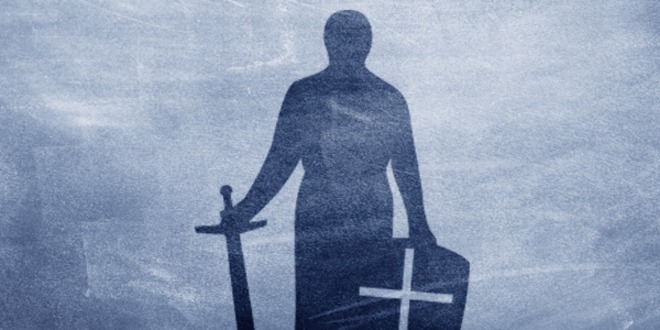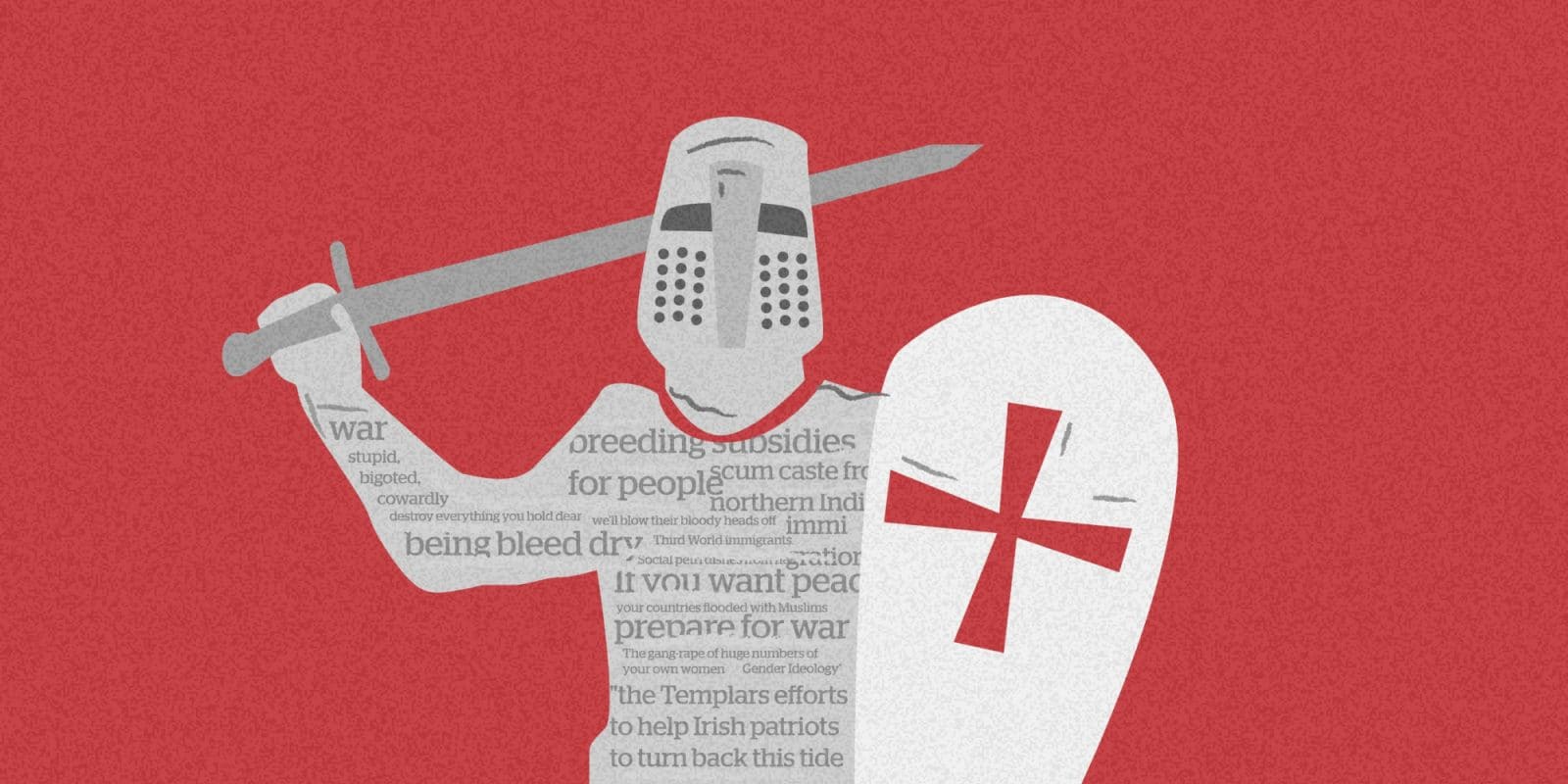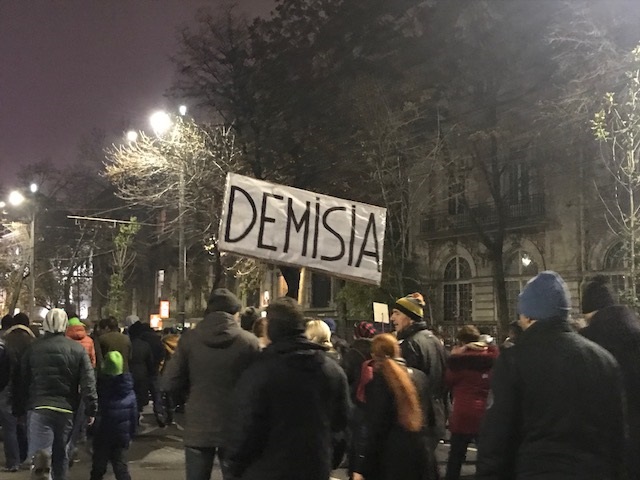When militant Christian campaigner Jim
Dowson was banned from Hungary in April 2017 for posing a “danger to
national security”, he was able to protest his innocence – and even appeal for funds for his legal defence – across a sprawling network of websites and social media pages which dwarfs many mainstream media outlets and political parties.
Research by the Balkan Investigative Reporting Network, BIRN, which collaborated with the BBC for this investigation,
has found that at the centre of this lucrative spider’s web of
patriotic sites is the Knights Templar International (KTI) portal, which
is named after the famous Medieval Christian crusaders and is closely
tied to Dowson, although he denies having any official role in the
organisation.
Its jokey memes, patriotic videos and far-right
material are shared across 14 Facebook pages which have earned 2.5
million ‘likes’ from the social network’s users – including three
serving British MPs, this investigation can reveal.
The KTI
insists it is not a racist organisation, but the BIRN has also uncovered
inflammatory language being used across its media platforms – Muslim
communities in Western Europe referred to as “rats’ nests” and Roma branded a “criminal scum caste”.
With Dowson now banned from Hungary, formerly a key hub in the network, he and the KTI are turning increasingly to Belgrade for their media activities, we can reveal.
This includes filming ‘news’ videos from the capital, helping to launch websites and training far-right groups and activists, some with questionable pasts and connections, in how to win an ‘online war’.
Alongside the media training, the KTI, which Dowson describes as a “militant Christian order”, is preparing for what it believes is imminent war between Islam and Christianity by building a network of groups which will become militias when fighting begins, Dowson explained in an interview with James Kelso for the right-wing radio programme ‘The Trump Phenomenon’ in January.
KTI’s support has included providing tactical vests (protective body armour) and communications equipment to unnamed Serb groups in the tinderbox area of northern Kosovo.
Dowson declined to answer most of BIRN’s questions but strongly denied any connections to neo-Nazis.
‘Britain’s most influential far-right activist’
Dowson is a Protestant Scot who grew up in the shadow of violence in Northern Ireland. He says he fought and was wounded as a combatant against the Irish Republican Army, IRA, a paramilitary group which carried out a campaign of bombing across the UK as it attempted to unify Ireland.
After working as an anti-abortion activist, Dowson helped the far-right British National Party raise large sums while working with Nick Griffin, the party’s leader, who once served as a member of the European Parliament and now frequently works with Dowson in Serbia.
Dowson then set up the Britain First nationalist group in 2010 before leaving it in 2014.
London-based anti-fascist organisation Hope not Hate claims Dowson helped Britain First secure more than a million Facebook followers by mixing “emotive memes” with “hard-hitting right-wing and socially conservative material”, turning it into a major force online, although it had no success at the ballot box.
The staunchly anti-immigration movement came to the world’s attention in November 2017 when US President Donald Trump retweeted two controversial videos posted by one of the group’s leaders.
Britain First was removed from Facebook in March after the social media network said it had “repeatedly posted content designed to incite animosity and hatred against minority groups”.
Hope not Hate claims in its February 2017 report, that following his departure from Britain First, Dowson then used Budapest as a base to run a network of “patriotic” websites and set up a hub for his latest venture, KTI. Similar findings were also documented by the International Report Bigotry and Fascism.
In the same report, Hope not Hate named Dowson as “Britain’s most influential far-right activist”.
“His social media skills have raised his profile in the European far right and opened doors to new political and professional relationships,” the anti-fascist campaigners added. The Times of London called him an “extremists’ marketing mastermind”.
Dowson has boasted on videos posted across the KTI network of running “one of the world’s large media companies”, and “having been being credited with the Brexit result and helping elect President Trump” – a claim which mirrors that made in KTI’s own annual reports.
In January, he gave an hour-long interview with ‘The Trump Phenomenon’Radio show about the work of the KTI. In it, Dowson was introduced as the “director or main consultant for the Knights Templar”.
During the interview, he boasted of the reach that the KTI’s social media had built.
“One of the things we do as a modern order is we run huge social media sites right across the world,” he said. “We had about 30 guys – 30 young Europeans, Hungarians, Serbs, Brits, Irish during the Trump election campaign. We were the guys punching out all the emotive memes.
“We were producing thousands of them per week. We were reaching at one point 70 million Americans per week,” he claimed.
He did not name the social media pages, but BIRN has identified 14 Facebook pages whose content has come predominantly from the KTI or linked websites. Since January 25, the KTI’s membership page has been shared 500 times across 11 of these Facebook pages.
The Facebook pages are named to appeal to different sections of the social network’s audience, such as “Newschicken”; “Proud to Wear my Poppy ” and “President Trump – Make America Great Again”, said Andrej Petrovski, a Belgrade-based cyber forensic specialist who worked with BIRN on this investigation.
“They [KTI] are using the possibilities offered by social media to micro-target people from different walks of life, from hooligans to nurses to MPs, serving them with content that is appealing to a particular group,” Petrovski explained.
“This has resulted with over 2.5 million followers across several pages on Facebook, which is more than the followers of the UK Conservative and Labour party on Facebook combined. This number means quite a substantial reach, as the reach exponentially grows with the number of followers,” he said.
Petrovski added that finding three serving British MPs, as well as hundreds of health workers and British civil servants among those liking the pages, was worrying. “With civil servants liking these pages, the likelihood of other people doing the same is higher, which is why public figures should pay attention what they promote through their activities on social media,” he said.
Dowson’s role with the KTI is, however, obscured by his insistence that he is not a member of the organisation.
He has previously admitted to assisting the KTI with “one or two projects”, but also said he did not hold a “position, title or authority”. He claims he is currently suing BIRN for an earlier story related to his activities in Kosovo.
Evidence obtained by BIRN suggests however that he is an important player for the organisation, even though he claims that he does not hold an official position.
Dowson has been a regular public face for KTI, presenting many of its videos, speaking to the media as a representative of the group and giving speeches at events.
He has been described on the KTI’s website as a KTI “brother”, a “spokesman” and “valued and trusted advisor” – although the KTI has recently removed many of these pages.
The Northern Ireland-based company listed on the website as the recipient of KTI membership fees, Knights Templar International Novus Ordo Militiae Limited, is owned by Dowson’s sister-in-law Marion Thomas, who worked with him at the British National Party and was a director of one of his earlier firms.
Dowson is himself owner of The Rosslyn Portal Limted which operates the rosslynportal.com website, selling identical memorabilia to the KTI website, and is hosted on the same IP as knightstemplarinternational.com. Until recently, another website, thelifeleague.com, was also hosted on that IP address and was registered personally by Dowson.
His contacts in Serbia, including Dejan Damjnajovic, of the Order of the Dragon, and Filip Milinic, leader of Generation Identity, identified Dowson as a senior figure in KTI.
A fresh start in Serbia
Dowson was banned from Hungary in April 2017 because, he said, he posed a “danger to national security” – something he denies strenuously. He is currently appealing the decision through the courts in Budapest and the KTI has sought donations for the legal costs through an appeal on the website.
In Serbia, however, Dowson and Griffin, who was also banned from Hungary and is appealing against the decision, appear to have found a new hospitable base to pursue some of their activities.
Since March last year, more than a dozen KTI news have been filmed in Serbia and uploaded to various YouTube channels, including Templar News and Knights Templar International and to the websites in the network, and have been shared on social media.
The presenter of these reports, BIRN has discovered, is Marina Milenov, a young Serb who reads out far-right material in front of a superimposed panorama of the Serbian capital Belgrade.
The number of views on YouTube ranges from the low hundreds to thousands, but their impact is amplified by repostings on Facebook and linked websites. One video posted to the Knights Templar International’s Facebook account had been viewed 40,000 times at the time of this article’s publication.
In one clip, uploaded to YouTube, about the ‘Great Replacement’ – the theory that white Europeans are being replaced by immigrants – Milenov explains that foreigners are “people who want to destroy everything you hold dear” and who are responsible for “the “gang rape of huge numbers of your women”. Milenov then says the KTI is calling for “serious resistance” to be built up ahead of the “Islamic uprising”.
Serbia is not just providing a base for videos, it is also a “social media hub” for the KTI, according to its 2017 annual report. Dowson and the KTI declined to elaborate on this assertion.
But when asked about his activities in Serbia by BIRN last year, Dowson was modest. “I run a small marketing company and take on roles from many clients and it would be a gross breach of professional standards to discuss these roles with you or anyone else,” he said in a written statement issued last year.
Contacted by phone, Milenov declined to comment.
Dowson also helped launch a new nationalist website, Novigvozdenipuk.rs, for a Belgrade-based pro-monarchy group. Novi Gvozdeni Puk is a World War I regiment in what was then the Kingdom of Serbia.
The website was created for the Belgrade-based, monarchist Order of the Dragon, which has a number of ties to Dowson and the KTI.
Reporters discovered that the Novigvozdenipuk.rs website shares a unique Google Analytics ID, which allows the owner to track traffic, with the Knights Templar International website.
The Order of the Dragon leader Dejan Damnjanovic confirmed that he had worked with Dowson on the website, which went online last summer, but explained that it had later been taken down. The linked Facebook page remains active.
Retrieved Facebook pages from a now-deleted section show the website was published by TPS Media, which gave the same address in central Belgrade as one posted by KTI on its “contacts page”. BIRN was unable to find a company of that name or the location of the office, but tpsmedia.eu is registered at the same IP as Knights Templar International and, until very recently, thelifeleague.com, which was registered by Jim Dowson personally.
“It’s his [Dowson’s] company,” Damnjanovic said of TPS Media.
Waging an ‘internet war’
In his January interview for US radio programme ‘The Trump Phenomenon’, Dowson explained the importance KTI placed on providing free courses on media to ensure that “our people [are] fully trained in modern means of communications”.
This tallies with a Facebook message posted to his personal page in January. Accompanying three photos of what appeared to be Dowson training a group of men, he wrote: “The modern war is fought on-line…for now!”
A Twitter post from the same event explained he was “media training in Serbia”. While it is not clear whether this event was linked to the KTI, a flag of the organisation is visible on one of the tables on one of the photos.
The identity of the group being trained has not been revealed, but one far-right organisation which admits receiving social media advice from Dowson is the Belgrade branch of Generation Identity, an international anti-immigration movement.
Filip Milinic, leader of Generation Identity (GI), told the BBC: “Jim [Dowson] has a reputation of being very skilled in social [media]. He did offer advice and it was various useful, because now, for example, we have over 7,000 likes on Facebook.
“It has been very helpful, and we hope they will come again soon,” he added. Milinic later denied that GI had received any “training” from Dowson when contacted for clarification yesterday.
A photograph from 2016 shows Milinic and another far-right activist Marko Gajinovic, meeting Dowson and Griffin in Belgrade for an event organised by another right-wing group, NSF, at which Griffin spoke.
A few days later, photos were posted to the KTI’s Facebook page showing Gajinovic with various figures cloaked in Templars’ robes holding the Templars’ and the Serbian flags.
Both Milinic and Gajinovic attended a small rally in March to commemorate WWII-era Serbian Prime Minister Milan Nedic, who led a Nazi puppet government. Gajinovic was photographed apperently performing Nazi salutes and the Belgrade prosecution told BIRN that the incident is now under investigation.
Milinic said the event was not organised by GI and that Gajinovic was not a member of his group. Gajinovic did not respond to requests for comment, but in a Tweet denied there were any “Sieg Heils” at the event, saying the photos showed people gesticulating like at a sports event.
Dowson said he had not trained Generation Identity in Serbia and had fought against Nazis all his life.
In a written response to BIRN, he said: “As I have seven live legal cases regarding false media allegations against you and several other Soros/Western funded puppet fake news outlets in the courts at Belgrade, I am limited in response.
“However, let me be very clear: at no time have I ever supplied media or IT or any other kind of training to those groups mentioned, Generation Identity or Neo Nazis in Serbia.”
Dowson and Griffin have also built a close relationship with Misa Vacic, the former head of the far-right 1389 group – named after the year of the famous Battle of Kosovo, a touchstone for Serbian nationalists.
Vacic was briefly an adviser to Marko Djuric, the head of the Serbia’s Office for Kosovo, in early 2017, and invited Dowson and Griffin into the government building.
In 2013, Vacic was given a suspended jail sentence for discrimination against the LGBT community.
But when Vacic launched a new far-right movement last year, Serbian Right, a senior member of the ruling Serbian Progressive Party was also present, raising further questions about Vacic’s connections to the government after his spell as an adviser.
At the organisation’s second major meeting in February, Vacic invited Dowson, Griffin and Russian intellectual Leonid Savin, who edits the website of Konstantin Malofeev, who has been sanctioned by the US for support for pro-Russian separatists in Ukraine.
Dowson told the audience that they needed to work together to counter the threat of immigration. “The West is flooded with hordes of Islamic conquerors from the east, sixty million of them and still counting,” he said.
Since then, Dowson and Griffin have made a number of trips to Belgrade to train Serbian Right in social media skills, according to press releases and social media postings by the movement.
“Our friends, Dowson and Griffin, are the true masters of their craft,” Vacic said in a press release. “Their experience is precious to us, their desire is to transfer to us their techniques and knowledge with which we will be able to continue our political fight.”
Vacic declined to comment. In response to BIRN’s question about his activities in Serbia, Nick Griffin wrote:
“Tell whatever lies and twist whatever truths you want, the corrupt Washington-centric world for which you are propaganda prostitutes is coming to an end. Europe will be free and Christian, and Kosovo Je Srbija [Kosovo is Serbia].” [click here for full comment]
Marinika Tepic, a MP for the left-wing Nova Stranka party, says she was taunted online by Vacic and members of Generation Identity after she raised the issue of Dowson’s activities in parliament and his delivery of equipment to Kosovo Serbs
Following her statement, graffiti attacking her was painted across the city and one nationalist journalist is due to face trial for allegedly issuing a death threat.
Tepic said that she had been informed that some extremist groups even began to call her “Jo” in private messages, in reference to Jo Cox, the British MP murdered in 2016 by a far-right extremist.
There is nothing to connect Dowson to any these incidents, but Tepic told BIRN that she believes he sees Serbia as his “new target”. “His words are dangerous,” she added.
In his interview with ‘The Trump Phenomenon’, Dowson described his trip to Kosovo to deliver equipment: “We took a huge consignment of bullet proof vests and tactical equipment and comms equipment just a few months ago, we took them into Kosovo, which is quite hazardous, I was on that journey, I was on that convoy.
“When we took them in, and of course the Western media wanted us arrested, you know, they tried to imply that I was supplying arms – look, taking arms to the Balkans is like taking arms to Texas – there is no need.
“Communication equipment and sophisticated modern stuff is needed, but you don’t have to take arms to Kosovo, believe me,” he said.
He later added in the same interview: “Right now we don’t need AK-47s, right now we need technology – the AKs will come later.”
In an interview recorded with the BBC following publication of this article, Dowson “apologised unreservedly” for his comments on “AKs”, adding: “That’s an extremely bad turn of phrase.
“The Balkans are awash with arms – to suggest that me or anybody else would be nudge, nudge, wink wink “we’ll get you arms” is utterly ludicrous.”
Additional reporting by Kreshnik Gashi.
This investigation is produced by BIRN as a part of Paper Trail to Better Governance project.
This article was updated on May 2 to include comments from Jim Dowson, broadcast in an interview for BBC Radio 4 following publication of the article
Whistleblower alleges lucrative network
A whistleblower told the BBC, as part of its collaboration with BIRN for this investigation, that the sprawling network of websites and Facebook pages linked to Knights Templar International is also lucrative.
Information seen by BIRN shows that the 19 websites registered under one Google Advertising account [which does not include knightstemplarinternational.com] made at least 60,000 euros since 2016.
The Google Ads account is currently registered to The Patriot Society, a firm owned by Marion Thomas, Dowson’s sister-in-law, but the address given is Dowson’s home.
The bank account currently registered to receive payments is Brightnote Limited, a Northern Irish firm fully owned by Dowson, although it is not clear how much money it has received.
All 19 websites had disappeared last night when BIRN checked, including their archives, but cached pages showed that the most popular sites had been publishing well into April.
In a live interview with the Victoria Derbyshire show on BBC2, Dowson said: “I don’t make any money from any ads. I do not have any wallet with any money.
“This guy [the whistleblower] spoke their about £100k going into a single wallet held by Jim Dowson – it is nonsense.”
According to an earlier interview with Dowson, KTI has 5,000 members in the US alone, representing potential earnings of $445k a year if each is paying the $89-a-year fee.
Dowson told the BBC in an interview recorded following publication of this article: “I personally have […] never made a single penny on any website from advertising, ever.”
But he added: “It is possible that companies that I am associated with have earned money from Google Ads. Where that money then went – I don’t know – I will need to look into it.”




